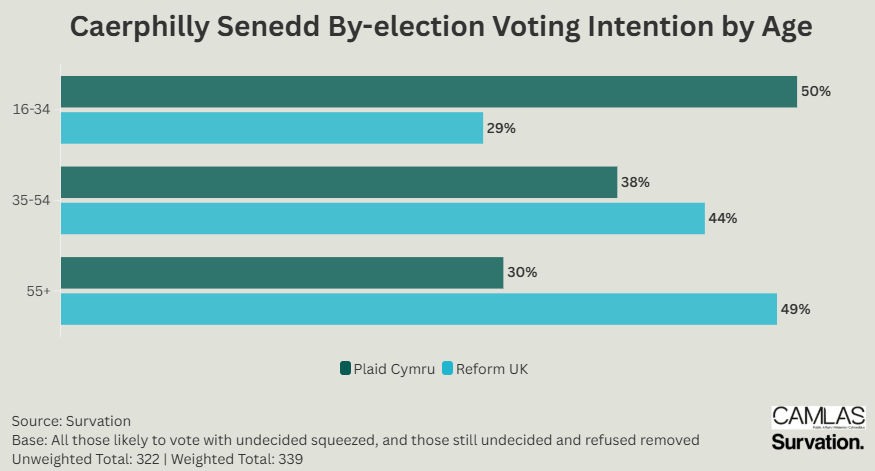
Does the Caerphilly by-election signal the reconfiguration of Welsh politics? The displacement of Labour by Plaid and Reform
The Caerphilly Senedd by-election has sent shockwaves through Wales – and Downing Street. Plaid Cymru’s candidate, Lindsay Whittle, won the seat with 47% of the vote, with Reform UK’s Llŷr Powell in second on 36%. On the back of their rise, support for Labour collapsed, coming in third with 11% of the vote (-35) and the Conservatives arrived in fourth on 2% (-15). Our poll, released in the week prior to the by-election, correctly predicted the collapse of Labour and the Conservatives and the emerging two-horse race between Plaid and Reform in Welsh politics.
The poll, therefore, accurately predicted the dramatic decline in support for both Labour and the Conservatives. The contest became centred around Plaid and Reform who were neck-and-neck as the two parties most likely to have a chance of winning the by-election. Voters thus faced a choice between which party with a realistic opportunity to take the seat would come out on top and voted accordingly. Our work thus highlighted to the anti-populist electorate in Caerphilly the only option they had to keep Reform out – Plaid – and facilitated tactical voting up until the final ballots were cast. Whilst the discontented usually use by-elections as a moment to protest against the government, this does not appear to tell the full story in Caerphilly. With a record turnout for a Senedd by-election of 50.43%, residents were enthused and motivated to have their say in the battle between Plaid and Reform – decisively rejecting the latter.
So, after twenty-five years of Labour dominance in Wales, and over a hundred years in Caerphilly, what’s the cause of this seismic shift, and will it hold nationally?
The beneficiaries of disaffection with Labour
Plaid’s base was built on younger, more progressive voters who’ve lost faith in Labour’s record in government. Reform’s was built off the back of older, Brexit-era voters frustrated with the current trajectory. Moreover, with Labour having been in power in Wales for the past twenty-five years it makes it difficult to pass off the blame. Responsibility for poor performance when it comes to public services lay only with one party in voters’ eyes – and support has been withdrawn accordingly.
Labour have had a quarter of a century of dominance in Wales. It would appear that they have taken their electoral success in the Senedd for granted, losing touch with voters to the extent that Plaid and Reform are now the two obvious frontrunners. Their 2021 base has eroded to the point where just a third are still supporting them, with another third moving to Plaid and a quarter to Reform. At the same time, 70% of those who voted Conservative migrated to Reform in our poll.
Is Caerphilly a harbinger of things to come next May?
Whilst by-elections are often interpreted as outliers, unrepresentative of wider national trends, we have reason to believe that Caerphilly is demonstrative of such electoral movements, rather than being anomalous. Other polls have shown Plaid and Reform clearly out in front, with Labour and the Conservatives trailing in distant third and fourth place positions.
Labour have little time to turn things around ahead of the May Senedd elections, and if these new polling realities hold then they are on course to lose the Senedd for the first time in its history. Voters will increasingly have to make a choice between Plaid and Reform as the Welsh political landscape undergoes an unprecedented reconfiguration.
—
GET THE DATA.
Survation conducted a telephone poll of 501 Caerphilly residents aged 16+. Fieldwork was conducted between 7th – 14th October 2025 on behalf of Camlas. Tables are available here.
________________________________________
Survation. is an MRS company partner, a member of the British Polling Council and abides by their rules. To find out more about Survation’s services, and how you can conduct a telephone or online poll for your research needs, please visit our services page.
If you are interested in commissioning research or to learn more about Survation’s research capabilities, please contact John Gibb on 020 3818 9661, email researchteam@survation.com, or visit our services page.
For press enquiries, please call 0203 818 9661 or email media@survation.com
< Back

